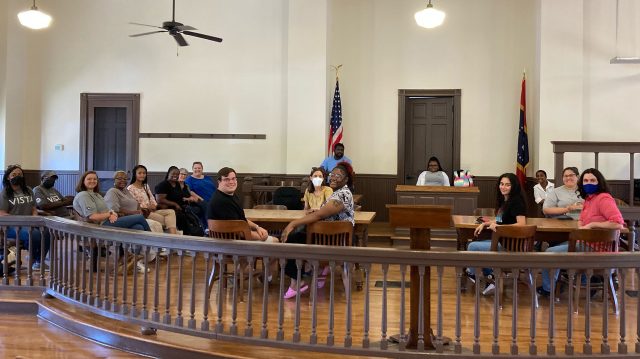
Members of the North Mississippi VISTA Project learn about the Emmett Till case in the courthouse where the trial for Till’s murder took place in Sumner. The visit was part of a tour of Mississippi Delta sites for the VISTAs. Submitted photo
OXFORD, Miss. – As they begin yearlong terms of service, members of the North Mississippi VISTA Project visited sites in the Mississippi Delta to build relationships among the group and make conceptual connections around poverty alleviation and its connection to racial justice and civil rights history.
The group traveled to Glendora and Sumner to visit the Emmett Till Historic Intrepid Center, or E.T.H.I.C., and the Emmett Till Interpretive Center. For many, this was a first opportunity to visit rural Mississippi, and the Delta in particular. This led to conversations about the capacity of nonprofit organizations in rural communities and how VISTA members play a critical role in increasing capacity and building bridges.
“This trip served as opportunity to bring our VISTA cohort together and discuss a civil rights legacy that has had a profound effect on our state and our nation,” said Tracee Brooks, a project coordinator for the Grisham-Mclean Institute for Public Service and Community Engagement at the University of Mississippi.
“VISTA members examined how reconciliation with history is an ongoing action that is necessary to pursue transformative experiences and continue the work of building empowered communities.”
At E.T.H.I.C., the cohort learned about the history of Glendora and Till’s murder, as told by Mayor Johnny B. Thomas and the people of Glendora. Thomas established the museum in 2005 to provide “educational information about the past atrocities in hopes to make a brighter future and allow the healing to begin.”
In Sumner, VISTA members sat in the remodeled courthouse where the trial for Till’s murder took place. Benjamin Saulsberry, the public engagement and museum education director for the Emmett Till Interpretative Center, led them through a conversation about racial healing and the community apology issued by Tallahatchie County.
Through this conversation, the VISTA cohort examined what it means to face the racial injustices that have lasting effects on the communities where they will serve their terms of service.
“Looking back on the trip – after visiting the cotton gin where Emmett Till was brutally beaten and the courthouse where his murderers were found not guilty – I had a moment of profound sadness as a mother and a woman of color,” said Angela Pannell, a program development VISTA member serving with Wear It Well in Tupelo.
Pannell expressed hope that racism can be eliminated in America, noting that the apology offered by the town of Sumner represents progress.
“I think that we should finish the work that was started by the movement by trying to understand what we can do to move forward and not backwards,” she said. “I will do my part to help in the healing process by focusing on the positive things I left with that day.”
This trip was an opportunity for the VISTA cohort to have honest conversations about race and inequity, and how that relates to their work building capacity in communities experiencing persistent poverty. The group also discussed how understanding a community’s history is essential for building trust.
“The Delta trip took me back many, many years ago to when I was living in Los Angeles, California, as a young boy about 9 years old when Mr. Emmett Till was killed,” said the Rev. R.J. Wilson, a VISTA member serving in Holly Springs. “And back then, it had a profound effect on our community.”
Wilson is serving his third term an AmeriCorps VISTA and is a program development VISTA at the Holly Springs Career and Technical Center. There, he works to build partnerships with community colleges, universities and community partners to connect students with college and workforce readiness training programs.
“I’m grateful and thankful to the NMVP for exposing me to the E.T.H.I.C. and the Emmet Till Interpretive Center and bringing that moment back in my life. It has made a difference even now on how important it is to develop good relationships with other races and cultures.”
After the trip, Wilson invited Saulsberry to speak with students at the Holly Springs center.
The North Mississippi VISTA Project is accepting applications to join the fight to alleviate poverty in Mississippi. To learn more, visit https://vista.olemiss.edu/.